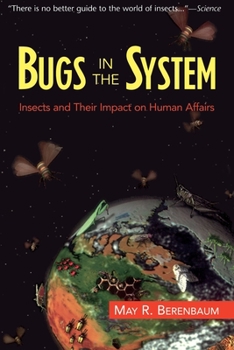Bugs in the System: Insects and Their Impact on Human Affairs
Select Format
Select Condition 
Book Overview
An introduction to insect physiology, genetics and behaviour which looks at the interaction between humans and insects, and explores both the positive and negative aspects of the relationship.
Format:Paperback
Language:English
ISBN:0201408244
ISBN13:9780201408249
Release Date:June 1996
Publisher:Basic Books
Length:400 Pages
Weight:1.27 lbs.
Dimensions:1.1" x 6.0" x 9.0"
Age Range:18 years and up
Grade Range:Postsecondary and higher
Customer Reviews
5 ratings
Enjoyable read
Published by Thriftbooks.com User , 16 years ago
Who knew that you could pack in a book SO MUCH information- in nearly every paragraph there is a 'wow' fact- and still make it stimulating and readable throughout. This book is great for professional entomologist and curious, broadly-educated layperson alike. There's actually a surprising amount of history and politics involved in the telling of the role insects have had on earth. Of course, the world of insects is so varied and vast, it alone provides for fascinating exploration. Dr. Berenbaum is an able and entertaining guide. I heartily recommend!
makes fleeting nuisance of bugs very very interesting
Published by Thriftbooks.com User , 18 years ago
In "Bugs in the System", Berenbaum sets out to counter the common perception of bugs as boring and icky. "There is no other life form on the planet," she writes, "whose lives are as inextricably bound up with our own....most people are completely unaware of the extent to which life and culture are shaped by insects." With masterful storytelling and flashes of wry humor, Berenbaum explores the role of insects in the human economy, in the disasters of war, and as the unseen, though vital, architects of our ecosystem. Tropical ants, for example, sometimes function as the "gardeners" of rainforest canopy biota, where they cultivate and guard the plant species on which they depend from predators and other competitors. Pollination, of course, is the most important contribution of insects to human society. Migratory bee keepers - a huge agricultural industry - follow the seasons to keep their bees busy year round; for a fee, they fertilize fruits, beans and many other staple crops, in addition to producing honey. Without them, countless plant species would fail to reproduce. Less well known are the roles of termites and other detritivores, Berenbaum writes, "spectacular consumers of dead, decayed, or otherwise seemingly inedible foodstuffs." They help to prevent wood, leaves, and animal products from collecting as toxins in the ecosystem. The introduction of cattle into Australia, for example, disrupted the recycle role of outback dung beetles, who had evolved alongside the marsupials. Soon "cattle dung accumulated at an alarming rate", which spawned huge populations of pest flies and choked the land. Only the introduction of forty-four non-native species - in the Dung Beetle Project - allowed the cattle and dairy industries to thrive in Australia. Unfortunately, Berenbaum says, insects are perhaps also man's worst enemy. Many insect parasites have developed clever survival tactics. Lice and fleas, for example, have unusually tough exoskeletons, and are often flat, almost two dimensional; this way, they can withstand our efforts to crush them. To anchor themselves on the skin of their hosts, they have backward-pointing spines, which are surprisingly resilient barbs. On the other hand, mosquitoes and horse flies are extremely nimble navigators, expert at frustrating our slapping hands. As the vectors of disease, parasitic insects have had an enormous impact on human history, which Berenbaum chronicles in fascinating detail. In the Fourteenth Century, the flea-borne pneumonic plague decimated Medieval Europe, eventually killing a third of the population. Because the supply of labor fell so low, Aristocratic landowners were forced to pay higher wages and grant other concessions to serfs and laborers; they never fully recovered their power. Labor, it seems, owes one of its great early victories to bugs. During times of war, concentrated groups of soldiers became an ideal breeding grounds for lice, the notorious carriers of typhus. Na
Goodness
Published by Thriftbooks.com User , 18 years ago
The product arrived on time and it was exactly what I ordered. It was also for a very good price. It was in perfect condition.
Great Source of Insect Facts
Published by Thriftbooks.com User , 21 years ago
This book is the best source of insect trivia that I have ever seen! I have used it as a source for questions for the Entomological Society of America Linnaean Games for several years, while I served on one of the ESA branch Linnaean Games committees. It is simply great!May Berenbaum has a very informal and humorous style that appeals to both the public and students. If, after reading her book, you still think insects are icky or uninteresting you are certainly made of stone. The number of little known facts in this book is simply huge. If you use just one book for reference on insects, Dr. Berenbaum's book would be a very good candidate. She treats everything from the invasion of the cotton boll weevil and the mysterious extinction of the Rocky Mountain locust to insects in movies and as human food.If you do not like insects or are afraid of them, you really should read this book. It will go a long way toward desensitizing you and make you fascinated with insects instead. I recommend this book highly to everybody from elementary school to retirement.
Fantastic bug book w/ bit of humor
Published by Thriftbooks.com User , 26 years ago
This book was so good! It provided me with everything I wanted to know about the insect world. It also included some humor (i.e. Reproduction chaper intitled "Sex, Bugs, and Rock & Roll). I recommend this to everyone who wants to know about how precious insects are to our life.





